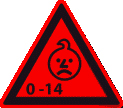|
Danger |
Swallowing
Children could swallow small magnets. |
|
Danger |
Electrical Conductivity
Magnets are made of metal and conduct electricity. |
|
Notice
|
Influence on People According to the current level of knowledge, magnetic fields of permanent magnets do not have a measurable positive or negative influence on people. It is unlikely that permanent magnets constitute a health risk, but it cannot be ruled out entirely. · For your own safety, avoid constant contact with magnets. · Store large magnets at least one metre away from your body. |
|
Notice |
Splintering of coating Most of our neodymium magnets have a thin nickel-copper-nickel coating to protect them from erosion. This coating could splinter or crack due to collision or large pressure. This makes them vulnerable to environmental influences like moisture and they could oxidize. · Separate big magnets, especially spheres, with a piece of cardboard. · Avoid collisions of magnets as well as repeated mechanical exposure (e.g. blows, bashes). |
|
Notice |
Oxidation, Corrosion, Rust
Untreated neodymium magnets oxidize quickly and disintegrate. · Use magnets only in the dry indoors or protect them against environmental influences. · Avoid damages to the coating. |
|
Notice |
Temperature Resistance
Neodymium magnets have a maximum working temperature of 80 to 200 °C. · Don't use magnets in places where they are exposed to extreme heat. · If you use an adhesive, don't harden it with hot air. |
|
Notice |
Mechanical Treatment Neodymium magnets are brittle, heat-sensitive and oxidise easily. · When drilling or sawing a magnet with improper tools, the magnet may break. · The emerging heat may demagnetise the magnet. · The magnet will oxidise and disintegrate due to the damaged coating. Stay away from mechanical treatment of magnets if you do not possess the necessary equipment and experience. |







